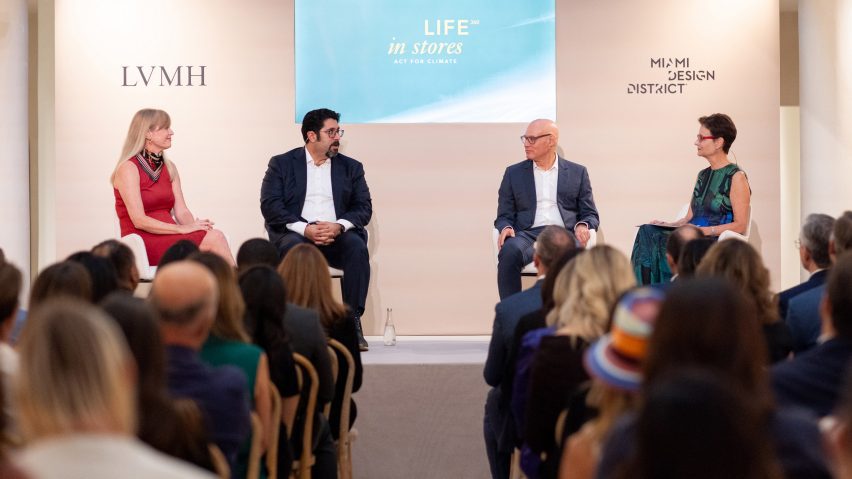Luxury goods company LVMH, which owns brands including Louis Vuitton, Dior and Fendi, has signed an agreement with Miami Design District to improve the environmental performance of its stores in the district.
Unveiled this week during Miami art week, the agreement will see the stores from the company's 15 brands in the district powered by solar from 2025. It also includes commitments on water and power use as well as material choices.
The agreement will allow the stores to be powered by renewable sources, even though LVMH does not own the properties.
"In most of our retail we don't own the premises, we're tenants, so we don't pay for the power or utilities, we pay our ledger," said CEO of LVMH North America Anish Melwani who signed the agreement with Craig Robins, CEO of Dacra, which co-owns Miami Design District.
"So even if you want to find renewable power there isn't a way to do it," he continued. "So that is the problem-solving that was required."
The Miami Design District is a neighbourhood in Miami, which has been developed since the early 2000s by Dacra and includes numerous luxury fashion stores, design shops and art institutions including the Institute for Contemporary Art.
It is home to 15 LVMH brands including Marc Jacobs, Givenchy, Fendi, Dior, Sephora, Bulgari, Hublot, Tiffany & Co, Berluti and Louis Vuitton, which is located in a store designed by Dutch studio Marcel Wanders.
The agreement also saw LVMH commit to targets on rainwater and power use – as well as waste. It will see a centralised energy monitoring system put in place in the district, along with a comprehensive stormwater management plan.
With its new stores and renovations of existing stores, LVMH will source the majority of materials from within Florida and 100 per cent of wood will be FSC-certified by 2025.
"As luxury brands, we have to create extraordinary environments for our customers. How do we do that with materials that can be sourced locally?" said Melwani.
"That's also part of the commitment that our stores are making, we're still going to export some things from exotic parts of the world, but we are going to do less of that – we'll take advantage of the extraordinary things that are available here."
LVMH signed the agreement as part of its ongoing strategy to improve the sustainability of its 5,600 global stores. Speaking at the event to mark the agreement, Melwani explained that focusing on sustainability was "existential" to the business.
"Luxury is all about making excellent products in the traditional methods," he said. "And for us means making, for example, fragrances with real flowers that are grown in fields, that means growing Champagne grapes that can only grow in the Champagne region."
"And so when you think about how many of our products come from natural things that have been grown in the same place for centuries, those coming under threat from climate change is existential," he continued.
"It's truly about protecting our business, our ability to do things the way they've always done."
The company aims to start replicating the partnership with its other landlords in the US and has begun similar initiatives in China and the Middle East.
The announcement follows British fashion designer Stella McCartney and LVMH presentation of a market of sustainable material innovations at climate conference COP28. The market presented 15 innovators that provided plant-based alternatives to plastic, animal leather and fur as well as regenerative alternatives to traditional fibres.
"The fashion industry accounts for eight per cent of global greenhouse gas emissions," McCartney said. "We need to get creative and innovative with alternatives, moving beyond the limited materials that the industry has been working with traditionally."
Miami art week takes place from 6 to 19 December in Miami, US. See Dezeen Events Guide for an up-to-date list of architecture and design events taking place around the world.

